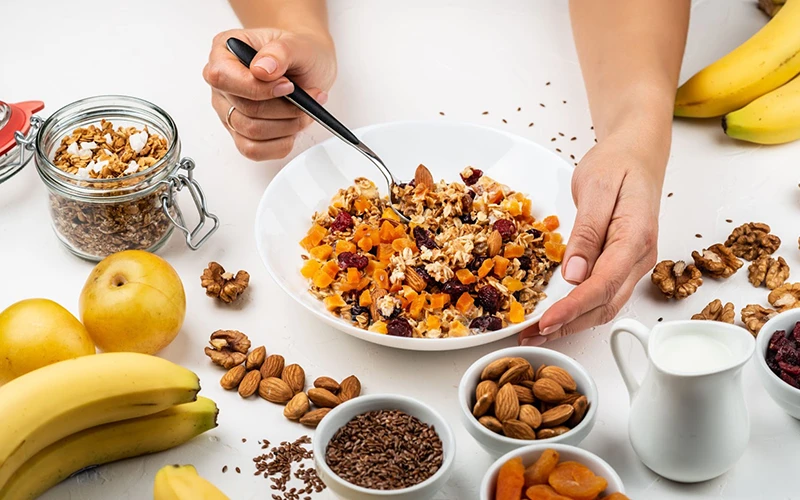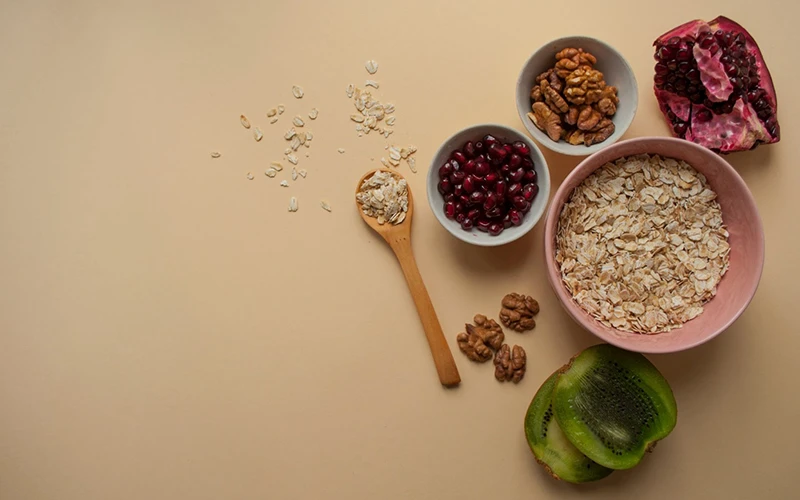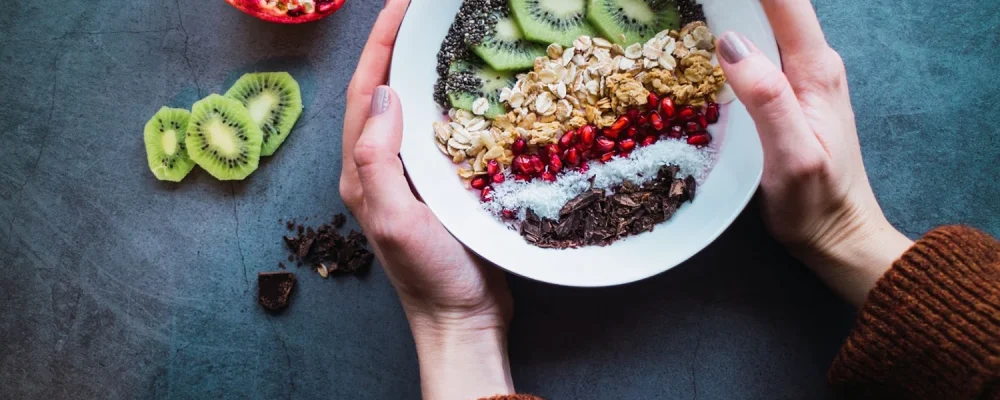If you’re following a vegan diet and curious about the best foods you should eat, you can rely on superfoods to take advantage of abundant natural nutrition from plants. These foods offer numerous benefits and can be a great addition to your vegan lifestyle.
In this article, we’ll explore some fantastic superfoods that you can enjoy while maintaining your vegan diet. Let’s dive deeper into the world of superfoods and explore the exciting options you can include in your plant-based meals!
Benefits of Superfoods in a Vegan Diet
Superfoods are primarily plant-based foods packed with essential vitamins and minerals that can contribute to better health and help prevent diseases. Including these superfoods in your vegan diet is a convenient way to enhance your nutritional intake, as a vegan diet primarily focuses on plant-based foods.
How? Well, plant-based superfoods are rich in antioxidants, which combat harmful substances in the body and reduce the risk of conditions such as heart disease and cancer.
Additionally, they are abundant in fiber, which promotes healthy digestion and helps maintain gut health. These foods serve as an excellent source of crucial vitamins and minerals like iron, calcium, and vitamin C.
While these nutrients are commonly associated with animal-based foods, they can be easily obtained from a well-planned vegan diet. Therefore, incorporating plant-based superfoods into your vegan diet can provide the following key benefits:
- It provides natural and whole food nutrients like antioxidants, fiber, protein, vitamins, and other important micronutrients.
- It’s a quick and easy way to meet your daily fruit and vegetable needs.
- It incorporates extracts from different foods around the world, so you get a well-balanced mix of nutrients.
- It gives you a natural energy boost.
- It helps strengthen your immune system.
- It costs less than vitamin and mineral supplements.
- Combining your superfood in your daily meal means you get all the necessary nutrients in one serving every day.
Superfoods You Can Eat When You Are on a Vegan Diet

Listed below are some fantastic vegan superfoods you can include in your regular diet. You don’t have to eat all of them but try to incorporate a few whenever possible.
Cruciferous Powerhouses
Cruciferous vegetables are packed with a potent phytochemical called sulforaphane, which research has shown to have impressive health benefits. Moreover, studies indicate that including these veggies in your diet may be linked to reduced depression, better pain management, weight control, and improved cardiovascular health.
Broccoli, Kale, and Cauliflower
When you’re following a vegan diet, there are plenty of superfoods you can enjoy to nourish your body. Three fantastic options are broccoli, kale, and cauliflower. These veggies are not only packed with essential nutrients but also incredibly versatile in your meals.
Broccoli contains fiber, vitamin C, and antioxidants, promoting a healthy immune system. Kale, a leafy green powerhouse, is loaded with vitamins A, K, and C, as well as minerals like calcium and iron, supporting bone health and boosting energy levels.
Cauliflower, known for its versatility, is low in calories but high in vitamins C and K, fiber, and antioxidants, aiding digestion and reducing inflammation. Incorporating these superfoods into your vegan diet will not only provide you with a wide range of nutrients but also add delightful flavors to your meals.
Nutrient-Dense Berries
Berries are rich in potassium, magnesium, vitamins C and K, fiber, and prebiotics, which are carbs that promote a healthy gut. Research conducted by Harvard Chan School scientists has shown that eating blueberries can decrease the risk of Type 2 diabetes.
Additionally, consuming foods high in anthocyanins (mostly blueberries) can help maintain weight loss, and berries, in general, can reduce the risk of heart attacks while boosting learning and memory.
Blueberries, Acai, and Goji Berries
Blueberries, Acai, and Goji Berries are nutrient-rich superfoods for vegans. Blueberries are packed with antioxidants and flavonoids, which help lower the risk of heart disease and cancer, while Acai berries improve liver and kidney functions.
Goji berries support longevity and vitality. Including these berries in a vegan diet provides a wide range of necessary vitamins, minerals, and antioxidants for overall health.
Omega-3 Rich Options
Omega-3 fatty acids are super important for our heart, brain, and for fighting inflammation, but most of us don’t get enough of them. But here’s the thing—it can be tough to get your omega-3s if you eat a typical American diet. And for vegans and vegetarians who avoid fish, it’s even harder.
But guess what? Fish isn’t the only way to get your omega-3 fix. There are some awesome plant sources that can give you a boost of these essential fats, and they’re packed with other important nutrients too.
Chia Seeds, Flaxseeds, and Walnuts
Chia seeds, flaxseeds, and walnuts are all excellent sources of omega-3 fatty acids, making them great choices for boosting your intake. Chia seeds offer a whopping 5 grams of omega-3s in just one ounce, along with a good amount of fiber and vegan calcium.
Flaxseeds, on the other hand, deliver the highest amount of ALA omega-3s among all known foods, providing more than double the daily recommendation in just a tablespoon. They are also rich in fiber, protein, and magnesium. As for walnuts, they contain 2.5 grams of ALA in just one ounce, surpassing the daily recommendation for women.
Incorporating these omega-3 rich options into your diet is easy, whether you sprinkle chia seeds on your favorite foods, add ground flaxseeds to smoothies or oatmeal, or enjoy walnuts in salads, baked goods, or pesto. These simple additions can help you reap the benefits of omega-3s for optimal health.
Plant-Based Proteins
A lot of people worry that if you’re on a vegan diet, you might not get enough protein. But don’t worry, experts say that a well-planned vegan meal can give you all the nutrients you need, including protein.
There are many plant-based sources of protein that vegans can eat. Some plant foods have more protein than others, and studies show that diets higher in protein can help with things like muscle strength, feeling full, and weight loss. So, if you’re following a vegan diet, you can still get plenty of protein to keep you healthy and strong.
Quinoa, Lentils, and Hemp Seeds
Quinoa, hemp seeds, and lentils are all nutritious foods that can be part of a healthy meal. Quinoa is a gluten-free pseudocereal with high protein content and essential nutrients like iron and magnesium. Lentils are full of protein, fiber, and vitamins and can help reduce your chance of developing many diseases. Hemp seeds have a lot of protein but also contain good lipids, minerals like magnesium and zinc, and omega-3 and omega-6 fatty acids.
You can enjoy these foods in various ways, from salads to soups or adding them to smoothies and homemade snacks. For their nutritional benefits, consider incorporating quinoa, hemp seeds, and lentils into your meals.
Calcium and Iron Rich Food
Getting enough calcium and iron is essential for your overall health. Calcium is crucial for strong bones, a healthy heart, and proper muscle function. You can find calcium in foods like collard greens, kale, broccoli, beans, almonds, and even in calcium-fortified rice.
Iron, on the other hand, helps your blood carry oxygen and fuels energy production. To maximize iron absorption, include foods rich in both iron and vitamin C in your diet, such as dark-green leafy vegetables and yellow bell peppers. By following a plant-based diet and using resources like the Vegan Food Pyramid Plate, you can easily meet your nutritional needs.
Almonds, Tofu, and Legumes
Almonds, tofu, and legumes are all excellent sources of calcium and iron. Just a small handful of almonds, about 23 nuts, can provide you with 6% of your daily value of calcium. Tofu, made from soybeans, is a plant-based protein option. It contains around 15% of the daily value for calcium in a 3-ounce serving. It’s also a source of potassium and iron. Tofu’s versatility allows it to be used in various recipes, adding a mild taste and absorbing the flavors of other foods.
As for legumes, research suggests they can lower total and LDL cholesterol, which is associated with heart disease. Legume consumption is also linked to lower blood pressure. While the direct impact of legume consumption on cardiovascular outcomes may be moderate, they still contribute to a balanced diet by providing calcium and iron along with other essential nutrients.
Green Leafy Marvels
Leafy green vegetables are good for you! They give your body important nutrients and don’t have a lot of calories. They contain vitamins like C, A, K, and B vitamins. These vitamins are important for giving you energy, keeping your bones healthy, helping your immune system, and making your blood clot properly. Leafy greens also have minerals like iron, potassium, and folate, which are good for you.
One great thing about leafy greens is that they have fiber. Fiber is good for digestion and helps you feel full, which can help control your appetite.
Spinach, Swiss Chard, and Collard Greens
Spinach, Swiss Chard, and Collard Greens are nutrient-rich superfoods vegans love. Spinach offers antioxidants and vitamin K for wound healing. Swiss Chard provides iron, magnesium, and vitamins A, C, and potassium. Collard greens contain fiber, protein, and essential nutrients like vitamin K, calcium, and vitamin A. These leafy greens are vital for a healthy vegan diet.
Superfood Supplements
You may give your body the extra nutrients it needs to thrive by including superfood supplements in your diet. They are produced from ground up dry fruits, vegetables, herbs, and other nutritious components that can be used in smoothies and other foods.
Some superfood supplements contain fibers and other ingredients promoting digestion and overall gut health. It’s important to choose wisely with the growing number of superfood supplements available. These supplements come in different forms, like powders or capsules.
Superfood Powders, Superfood Capsules
Superfood powders are concentrated powders made from healthy foods. Superfood powders are concentrated sources of nutrients, including vitamins, minerals, antioxidants, and phytochemicals. They can boost overall health, enhance immune function, and support proper bodily functions.
Superfood capsules are special dietary supplements containing a mix of fruits, veggies, grasses, herbs, mushrooms, and more. Some people believe these capsules can aid in weight loss, control appetite, boost energy, and minimize the signs of aging.
Tips for Maximizing Superfood Nutrition

Now that you understand how superfoods benefit your body, you can add more to your meal plan. Sometimes it only takes a small shift to make a more nutrient-dense meal. For example:
- Switch from white rice to nutrient-dense brown rice.
- Replace sugary drinks with water, green tea, or maca for a healthier option.
- Boost your nutrient content by adding superfoods as toppings to pizza, tcos or sandwiches.
- Snack on vegetables or a handful of nuts instead of chips for a more nutrient-packed option.
- Satisfy a sweet tooth with naturally sweet fruits instead of candy and cookies, in order to get more vitamins and minerals into your diet.
- If you are busy and do not have the time to cook, you can also try superfood powders in many flavors. These ready-made powders are easy to drink; mix them with water.
By making simple swaps in your favorite recipes or reimagining your favorite dishes, you can increase the nutrient density of your family’s daily meals and snacks.
FAQs
Are Sweet Potatoes a Superfood?
Sweet potatoes are incredibly nutritious vegetables widely recognized for their health benefits. They have orange, or sometimes purple-colored flesh with essential minerals and vitamins A, B, and C. Many people consider sweet potatoes a superfood because of their outstanding nutritional value.
Where to Buy Superfood Supplements?
Superfood supplements can be purchased from various places. They are commonly available at health food stores, online retailers, and some grocery stores. Choosing reputable brands and carefully reading the labels is important to ensure you get high-quality supplements.
Are There Any Side Effects of Eating Superfoods?
Eating real food to get nutrients is often better than superfood supplements. They can even lead to too much of certain vitamins and minerals, causing toxicity. Plus, supplements can bring about unwanted side effects. So, focusing on a balanced diet of real, wholesome foods is best for your nutritional needs.
Final Thoughts
You can consume a variety of superfoods while maintaining a vegan diet. By including superfoods in your regular meals, you may satisfy your nutritional requirements and diversify your flavors while adhering to a plant-based diet.
For some, you may find a superfood powder is easier to consume and digest than a superfood pill. Plus, a powder offers more diversity on how it is incorporated into your diet, rather than a pill or capsule. These vegan superfoods are perfect for you if you want more energy, a stronger immune system, or just delicious and healthy meals. They’re perfect for supporting a well-rounded and active lifestyle.
RV Team
* Reviewology is in partnership or collaborates with top brands highlighted on this site, including those occupying the top ranking positions.
Additionally, we earn affiliate commissions from products showcased on this website when you make a purchase through the provided links on Amazon or the company website directly.
We appreciate your support using our links to purchase your favorite brands or newly discovered brands.
Latest updates
I Thought I’d Always Feel Tired, Fat, and Forgotten—Until This
310 Greens vs AG1
The Truth About 310 Greens: A No-Nonsense Review of This Popular Supplement
Popular
I Thought I’d Always Feel Tired, Fat, and Forgotten—Until This
310 Greens vs AG1
The Truth About 310 Greens: A No-Nonsense Review of This Popular Supplement
© 2024 Reviewology. All Rights Reserved.
